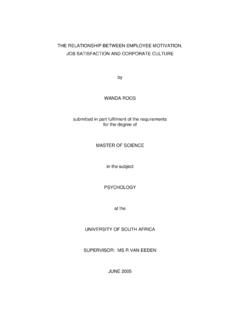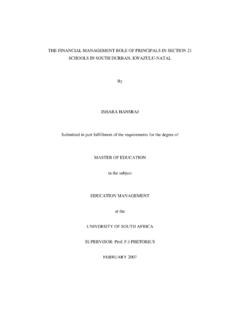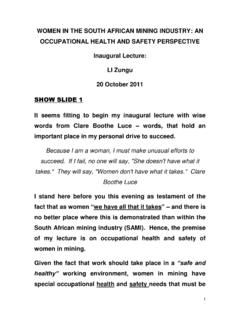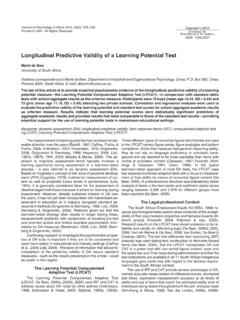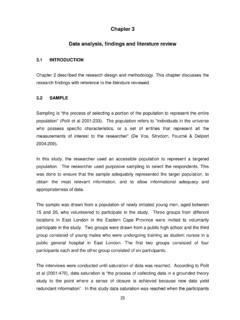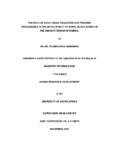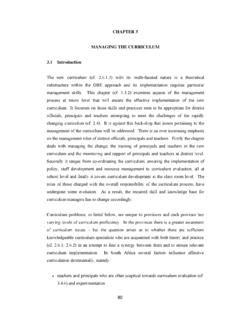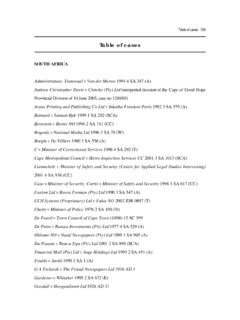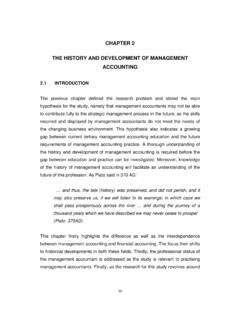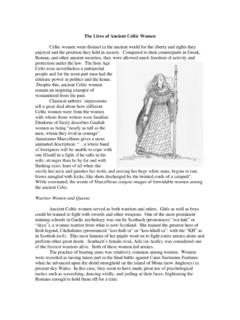Transcription of AFRICAN SPIRITUALITY 5.1 Introduction
1 CHAPTER FIVE. AFRICAN SPIRITUALITY . Introduction This chapter will describe AFRICAN SPIRITUALITY in detail and identify important aspects, particularly those which play a role in AFRICAN churches and social groupings today. A. question that must be aske d at the outset is whether there is such a thing as AFRICAN SPIRITUALITY . Courlander (1996:2) warns against a generalised use of terms such as AFRICAN society and AFRICAN experience , which tend to combine all the peoples of the vast continent of Afric a into one, and ignore the differences of culture, belief and practise. In the same way, we must be careful of a generalised use of AFRICAN theology and surely also of AFRICAN SPIRITUALITY . However, there are a number of ideas that are the same or similar throughout Africa, such as the prevalent belief in the power of the ancestors and practises of ancestor veneration.
2 Therefore, in a limited sense, one can identify a form of SPIRITUALITY which is uniquely AFRICAN , as one can identify a general trend in AFRICAN culture and AFRICAN theology. For practical reasons, this study has concentrated largely but not exclusively on the traditions of the peoples of Southern Africa. By this means, it is hoped that the study 1 will be more directly applicable to the churches in South and Southern Africa. However, it is noteworthy that many traditions are common to the southern Bantu speaking peoples as well as peoples of Central Africa, testifying to their common origin centuries ago (Courlander 1996:399). O'Brien Wicker (2000:198) describes the essential characteristics of AFRICAN SPIRITUALITY as adaptability, flexibility, tolerance and openness. It is these characteristics which have enabled AFRICAN traditions to co-exist alongside the dominant world religions of Christianity and Islam, and in many cases to form a syncretistic and eclectic religious system, drawing on elements from many sources.
3 1. Where possible, the same headings have been used for Chapters Four and Five, so as to facilitate easy comparison between Celtic and AFRICAN Spiritualities. However, where this structure seemed too contrived and not to mesh with the essential aspects of AFRICAN SPIRITUALITY , it has been changed. Thus, for example, both forms of SPIRITUALITY could be examined under the topic, View of the Material World. However, Spiritual Disciplines seemed to fit better with Celtic than with AFRICAN SPIRITUALITY . 131. It is also important to note at the outset that AFRICAN SPIRITUALITY is similar to other forms of SPIRITUALITY , in that it is not a static system of values, beliefs and behaviours, but a dynamic, changing way of life. This is often ignored by those who call for a return to an AFRICAN past' which perhaps no longer exists, or practices which have lost their meaning and significance for contemporary Africans.
4 AFRICAN culture is in flux, and so are AFRICAN values. In fact, Africans, as well as any community of people, are daily involved in the task of living in and building a culture (Wirsty 1995:35). All cultures grow and change with those who live by them. The majority of cultures interact with other cultures, and exchange influences across the culture barrier. The same is true of forms of SPIRITUALITY , interaction and interchange is not a mark of weakness, but of growt h. This chapter begins with an examination of the meaning of the term AFRICAN SPIRITUALITY '. A discussion of major component ideas of AFRICAN SPIRITUALITY follows, including The AFRICAN View of the Material World, The AFRICAN View of Work and Education and the relationship between AFRICAN SPIRITUALITY and power. Interpersonal relations are discussed with a particular focus on relationships between the genders.
5 This is followed by a discussion of the role of mediators from the spirit world and the importance of oral literature in AFRICAN SPIRITUALITY . What is AFRICAN SPIRITUALITY ? In order to be authentically AFRICAN , Christianity has to meet the needs of Africans in their present situation. Some of these needs are common to all human beings, while others are specifically related to problems of poverty and uncertainty which many Africans face on a daily basis. Penoukou lists the felt needs of Africans as follows: To eat when hungry To drink when thirsty To be cared for in sickness To save for the future To fight drought and bad weather of all kinds Freely to choose one's political leader and regime To succeed in life and society without being threatened or threatening others with poison or malevolent forces To be delivered from fears and delusions Not to be condemned to mimicking the errors of other civilisations 132.
6 To be enriched by these civilisations' wealth without being enslaved by any services they might render to their siblings To enrich other siblings without being plundered by them To utter and celebrate God with all that God has created in the divine image, in the traditions of the Ancestors (1995: 47). The AFRICAN SPIRITUALITY reflected in this poem is practical, pragmatic and rooted in the here and now. It is concerned with immediate needs, and immediate dangers, whether they are the simple need for food, drink and shelter or more complex needs such as political freedom and the need for respect and acceptance. The Church in Africa has expressed the need to liberate Christianity from Western dominance, in its teaching, in structures and power base and in developing forms of worship and communication which are appropriate to Africans, and enable them to make the gospel message their own.
7 The study of AFRICAN SPIRITUALITY in its own right is a recent phenomenon. Western scholars, such as Sir James Frazier, had had a fascination with AFRICAN religions, either from the scientific point of view, as a phenomenon to be studied, or from a missionary point of view. Both approaches assumed that Africa n religious beliefs were necessarily false, the scientists, because they automatically discounted the supernatural and the missionaries, because they claimed absolute truth for their religious doctrine, and denied that AFRICAN tradition had any value. It is only in the late twentieth century, with the rediscovery of oral communication and oral literature, that AFRICAN religious thinkers have been allowed to express their beliefs and world views on their own terms. Examples of these leaders in AFRICAN theology and SPIRITUALITY would be Archbishop Desmond Tutu, Charles Nyamiti, Kenneth Kaunda, Manas Buthelezi, Julius Nyerere and many others.
8 A parallel development has been the ability of many Africans to write about traditional beliefs and practises in world languages, allowing their knowledge to be disseminated widely across the academic world (Nasr 1996: 35). The change from a modern to post -modern philosophical milieu has also benefited AFRICAN art, literature and philosophy. Indigenous AFRICAN culture is no longer considered primitive' and therefore not worthy of serious study. Western scholars are beginning to study AFRICAN art and thought on its own merits. Thus, the compilers of the World 133. SPIRITUALITY series 2 have included a volume on AFRICAN SPIRITUALITY , along with other forms of SPIRITUALITY from different parts of the world, and from different religious traditions. A certain amount of confusion has arisen due to the tendency of Western scholars and missionaries to emphasise aspects of tradit ional AFRICAN belief which conflict with the Judaeo-Christian world view, rather than those which accord with it.
9 Thus, instead of wondering at the traditional AFRICAN concept of God, Western thinkers have emphasised fetishes, magic arts, the power of the spirits, and especially the ancestors (Oosthuizen 2000:279). While Oosthuizen tends to under-emphasise the exotic (by Western standards), in his efforts to reconcile scholars from mainline denominations to the AFRICAN Initiated Churches, he gives a time ly reminder that we should seek aspects of AFRICAN culture which can and should be integrated into church life and practice. The central characteristic of AFRICAN Christianity is that it is experience-based. The focus is not on abstract thought and logic , but on human experience, including experience of the divine. This is a feature of a culture and philosophical background which rests on oral rather than written forms of communication. In such an environment, symbolic actions and rituals become an important component of oral literature.
10 In the predominantly illiterate and relatively technologically simple societies of Africa where religion is more danced out than thought out, heavy intellectual theology wears thin. Such rationalization and theologizing as there are come after experience (Wakefield 1983:6). Having said that, we must also acknowledge that virtually every AFRICAN church community has been influenced by its missionary origins, or by other European and North American cultural influences, so that sometimes active resistance to Africanisation is encountered, especially within the mission-initiated churches. This has particularly been the case among AFRICAN Christians who were educated in Mission schools, and went on to assume leadership roles in their denominations. However, traditional influences remain, and in recent decades, many churches have made conscious efforts to reintroduce AFRICAN cultural elements into Christian worship.
